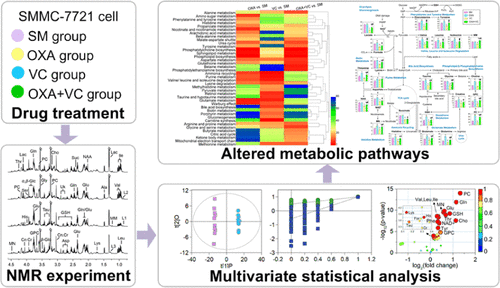当前位置:
X-MOL 学术
›
J. Proteome Res.
›
论文详情
Our official English website, www.x-mol.net, welcomes your
feedback! (Note: you will need to create a separate account there.)
1H NMR-Based Metabolic Profiles Delineate the Anticancer Effect of Vitamin C and Oxaliplatin on Hepatocellular Carcinoma Cells.
Journal of Proteome Research ( IF 3.8 ) Pub Date : 2020-01-09 , DOI: 10.1021/acs.jproteome.9b00635 Caigui Lin 1 , Jiyang Dong 1 , Zhiliang Wei 2 , Kian-Kai Cheng 3 , Jie Li 4, 5 , Song You 5, 6 , Yueyue Liu 1 , Xiaomin Wang 4, 5 , Zhong Chen 1
Journal of Proteome Research ( IF 3.8 ) Pub Date : 2020-01-09 , DOI: 10.1021/acs.jproteome.9b00635 Caigui Lin 1 , Jiyang Dong 1 , Zhiliang Wei 2 , Kian-Kai Cheng 3 , Jie Li 4, 5 , Song You 5, 6 , Yueyue Liu 1 , Xiaomin Wang 4, 5 , Zhong Chen 1
Affiliation

|
Hepatocellular carcinoma (HCC) is a leading cause of cancer death worldwide. Because of its high recurrence rate and heterogeneity, effective treatment for advanced stage of HCC is currently lacking. There are accumulating evidences showing the therapeutic potential of pharmacologic vitamin C (VC) on HCC. However, the metabolic basis underlying the anticancer property of VC remains to be elucidated. In this study, we used a high-resolution proton nuclear magnetic resonance-based metabolomics technique to assess the global metabolic changes in HCC cells following VC treatment. In addition, the HCC cells were also treated with oxaliplatin (OXA) to explore the potential synergistic effect induced by the combined VC and OXA treatment. The current metabolomics data suggested different mechanisms of OXA and VC in modulating cell growth and metabolism. In general, VC treatment led to inhibition of energy metabolism via NAD+ depletion and amino acid deprivation. On the other hand, OXA caused significant perturbation in phospholipid biosynthesis and phosphatidylcholine biosynthesis pathways. The current results highlighted glutathione metabolism, and pathways related to succinate and choline may play central roles in conferring the combined effect between OXA and VC. Taken together, this study provided metabolic evidence of VC and OXA in treating HCC and may contribute toward the potential application of combined VC and OXA as complementary HCC therapies.
中文翻译:

基于1 H NMR的代谢曲线描述了维生素C和奥沙利铂对肝癌细胞的抗癌作用。
肝细胞癌(HCC)是全球癌症死亡的主要原因。由于其高复发率和异质性,目前缺乏对晚期肝癌的有效治疗。越来越多的证据显示出药理性维生素C(VC)对HCC的治疗潜力。但是,VC的抗癌特性背后的代谢基础仍有待阐明。在这项研究中,我们使用了基于高分辨率质子核磁共振的代谢组学技术来评估VC治疗后HCC细胞的整体代谢变化。此外,还用奥沙利铂(OXA)处理HCC细胞,以探索VC和OXA联合处理诱导的潜在协同效应。当前的代谢组学数据表明,OXA和VC在调节细胞生长和代谢中的机制不同。通常,VC处理通过NAD +消耗和氨基酸剥夺导致能量代谢受到抑制。另一方面,OXA引起磷脂生物合成和磷脂酰胆碱生物合成途径的显着扰动。目前的结果突出了谷胱甘肽的代谢,与琥珀酸和胆碱有关的途径可能在赋予OXA和VC联合作用中起着核心作用。两者合计,这项研究提供了VC和OXA在治疗HCC中的代谢证据,并可能有助于VC和OXA联合作为HCC补充疗法的潜在应用。目前的结果强调了谷胱甘肽的代谢,与琥珀酸和胆碱有关的途径可能在赋予OXA和VC联合作用中起着核心作用。两者合计,这项研究提供了VC和OXA在治疗HCC中的代谢证据,并可能有助于VC和OXA联合作为HCC补充疗法的潜在应用。目前的结果强调了谷胱甘肽的代谢,与琥珀酸和胆碱有关的途径可能在赋予OXA和VC联合作用中起着核心作用。两者合计,这项研究提供了VC和OXA在治疗HCC中的代谢证据,并且可能有助于VC和OXA联合作为HCC辅助疗法的潜在应用。
更新日期:2020-01-24
中文翻译:

基于1 H NMR的代谢曲线描述了维生素C和奥沙利铂对肝癌细胞的抗癌作用。
肝细胞癌(HCC)是全球癌症死亡的主要原因。由于其高复发率和异质性,目前缺乏对晚期肝癌的有效治疗。越来越多的证据显示出药理性维生素C(VC)对HCC的治疗潜力。但是,VC的抗癌特性背后的代谢基础仍有待阐明。在这项研究中,我们使用了基于高分辨率质子核磁共振的代谢组学技术来评估VC治疗后HCC细胞的整体代谢变化。此外,还用奥沙利铂(OXA)处理HCC细胞,以探索VC和OXA联合处理诱导的潜在协同效应。当前的代谢组学数据表明,OXA和VC在调节细胞生长和代谢中的机制不同。通常,VC处理通过NAD +消耗和氨基酸剥夺导致能量代谢受到抑制。另一方面,OXA引起磷脂生物合成和磷脂酰胆碱生物合成途径的显着扰动。目前的结果突出了谷胱甘肽的代谢,与琥珀酸和胆碱有关的途径可能在赋予OXA和VC联合作用中起着核心作用。两者合计,这项研究提供了VC和OXA在治疗HCC中的代谢证据,并可能有助于VC和OXA联合作为HCC补充疗法的潜在应用。目前的结果强调了谷胱甘肽的代谢,与琥珀酸和胆碱有关的途径可能在赋予OXA和VC联合作用中起着核心作用。两者合计,这项研究提供了VC和OXA在治疗HCC中的代谢证据,并可能有助于VC和OXA联合作为HCC补充疗法的潜在应用。目前的结果强调了谷胱甘肽的代谢,与琥珀酸和胆碱有关的途径可能在赋予OXA和VC联合作用中起着核心作用。两者合计,这项研究提供了VC和OXA在治疗HCC中的代谢证据,并且可能有助于VC和OXA联合作为HCC辅助疗法的潜在应用。









































 京公网安备 11010802027423号
京公网安备 11010802027423号